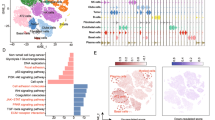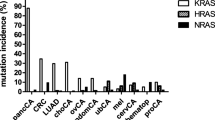Abstract
Background
Lung squamous cell carcinoma (LSCC) is a major histological subtype of lung cancer. In this study, we investigated genomic alterations in LSCC and evaluated the clinical implications of mutation burden (MB) in LSCC.
Methods
Genomic alterations were determined in Japanese patients with LSCC (N = 67) using next-generation sequencing of 415 known cancer genes. MB was defined as the number of non-synonymous mutations per 1 Mbp. Programmed death-ligand 1 (PD-L1) protein expression in cancer cells was evaluated by immunohistochemical analysis.
Results
TP53 gene mutations were the most common alteration (n = 51/67, 76.1%), followed by gene alterations in cyclin-dependent kinase inhibitor 2B (CDKN2B; 35.8%), CDKN2A (31.3%), phosphatase and tensin homolog (30.0%), and sex-determining region Y-box 2 (SOX2, 28.3%). Histological differentiation was significantly poorer in tumors with high MB (greater than or equal to the median MB) compared with that in tumors with low MB (less than the median MB; p = 0.0446). The high MB group had more tumors located in the upper or middle lobe than tumors located in the lower lobe (p = 0.0019). Moreover, cancers in the upper or middle lobes had significantly higher MB than cancers in the lower lobes (p = 0.0005), and tended to show higher PD-L1 protein expression (p = 0.0573). SOX2 and tyrosine kinase non-receptor 2 amplifications were associated with high MB (p = 0.0065 and p = 0.0010, respectively).
Conclusions
The MB level differed according to the tumor location in LSCC, suggesting that the location of cancer development may influence the genomic background of the tumor.


Similar content being viewed by others
References
Chen Z, Fillmore CM, Hammerman PS, Kim CF, Wong KK. Non-small-cell lung cancers: a heterogeneous set of diseases. Nat Rev Cancer. 2014;14:535–546
Tsao AS, Scagliotti GV, Bunn PA Jr, et al. Scientific Advances in Lung Cancer 2015. J Thorac Oncol. 2016;11:613–638
Gandara DR, Hammerman PS, Sos ML, Lara PN Jr, Hirsch FR. Squamous cell lung cancer: from tumor genomics to cancer therapeutics. Clin Cancer Res. 2015;21:2236–2243
The Cancer Genome Atlas Research Network. Comprehensive genomic characterization of squamous cell lung cancers. Nature. 2012;489:519–525
Kim Y, Hammerman PS, Kim J, et al. Integrative and comparative genomic analysis of lung squamous cell carcinomas in East Asian patients. J Clin Oncol. 2014;32:121–128
Heist RS, Mino-Kenudson M, Sequist LV, et al. FGFR1 amplification in squamous cell carcinoma of the lung. J Thorac Oncol. 2012;7:1775-1780
Alexandrov LB, Nik-Zainal S, Wedge DC, et al. Signatures of mutational processes in human cancer. Nature. 2013;500:415–421
Vogelstein B, Papadopoulos N, Velculescu VE, Zhou S, Diaz LA Jr, Kinzler KW. Cancer genome landscapes. Science. 2013;339:1546–1558
Champiat S, Ferte C, Lebel-Binay S, Eggermont A, Soria JC. Exomics and immunogenics: bridging mutational load and immune checkpoints efficacy. Oncoimmunology. 2014;3:e27817
Topalian SL, Hodi FS, Brahmer JR, et al. Safety, activity, and immune correlates of anti-PD-1 antibody in cancer. N Engl J Med. 2012;366:2443–2454
Brahmer J, Reckamp KL, Baas P, et al. Nivolumab versus docetaxel in advanced squamous-cell non-small-cell lung cancer. N Engl J Med. 2015;373:123–135
International Union Against Cancer. The TNM Classification of Malignant Tumors, 7th Edition. 2009.
Galateau-Salle F, Churg A, Roggli V, Travis WD. The 2015 World Health Organization Classification of tumors of the pleura: advances since the 2004 classification. J Thorac Oncol. 2016;11:142–154
Nagahashi M, Wakai T, Shimada Y, et al. Genomic landscape of colorectal cancer in Japan: clinical implications of comprehensive genomic sequencing for precision medicine. Genome Med. 2016;8:136
Takada K, Okamoto T, Toyokawa G, et al. The expression of PD-L1 protein as a prognostic factor in lung squamous cell carcinoma. Lung Cancer. 2017;104:7–15
Hecht SS. Tobacco smoke carcinogens and lung cancer. J Natl Cancer Inst. 1999;91:1194–1210
Byers TF, Vena JE, Rzepka TF. Predilection of lung cancer for the upper lobes: an epidemiologic inquiry. J Natl Cancer Inst. 1984;72:1271–1275
Gurney JW, Schroeder BA. Upper lobe lung disease: physiologic correlates. Review. Radiology. 1988;167:359–366
Bishawi M, Moore W, Bilfinger T. Severity of emphysema predicts location of lung cancer and 5-y survival of patients with stage I non-small cell lung cancer. J Surg Res. 2013;184:1–5
Kinsey CM, Estepar RS, Zhao Y, et al. Invasive adenocarcinoma of the lung is associated with the upper lung regions. Lung Cancer. 2014;84:145–150
Bae K, Jeon KN, Lee SJ, Kim HC, Ha JY, Park SE, et al. Severity of pulmonary emphysema and lung cancer: analysis using quantitative lobar emphysema scoring. Medicine (Baltimore). 2016;95:e5494
Petrelli F, Tomasello G, Borgonovo K, et al. Prognostic survival associated with left-sided vs right-sided colon cancer: a systematic review and meta-analysis. JAMA Oncol. 2017;3:211–219
Fields AP, Justilien V, Murray NR. The chromosome 3q26 OncCassette: a multigenic driver of human cancer. Adv Biol Regul. 2016;60:47–63
Wang J, Qian J, Hoeksema MD, et al. Integrative genomics analysis identifies candidate drivers at 3q26-29 amplicon in squamous cell carcinoma of the lung. Clin Cancer Res. 2013;19:5580–5590
Brunelli M, Bria E, Nottegar A, et al. True 3q chromosomal amplification in squamous cell lung carcinoma by FISH and aCGH molecular analysis: impact on targeted drugs. PLoS ONE. 2012;7:e49689
Lin Q, Wang J, Childress C, Yang W. The activation mechanism of ACK1 (activated Cdc42-associated tyrosine kinase 1). Biochem J. 2012;445:255–264
Mahajan K, Mahajan NP. ACK1/TNK2 tyrosine kinase: molecular signaling and evolving role in cancers. Oncogene. 2015;34:4162–4167
Disclosure
Author declares that they have no conflict of interest.
Funding
This project was supported by funding from Denka Co. Ltd. Tatsuro Okamoto is supported by Grant-in-Aid from the Japan Society for the Promotion of Science (#15K10263).
Author information
Authors and Affiliations
Corresponding author
Electronic supplementary material
Below is the link to the electronic supplementary material.
Rights and permissions
About this article
Cite this article
Okamoto, T., Takada, K., Sato, S. et al. Clinical and Genetic Implications of Mutation Burden in Squamous Cell Carcinoma of the Lung. Ann Surg Oncol 25, 1564–1571 (2018). https://doi.org/10.1245/s10434-018-6401-1
Received:
Published:
Issue Date:
DOI: https://doi.org/10.1245/s10434-018-6401-1




